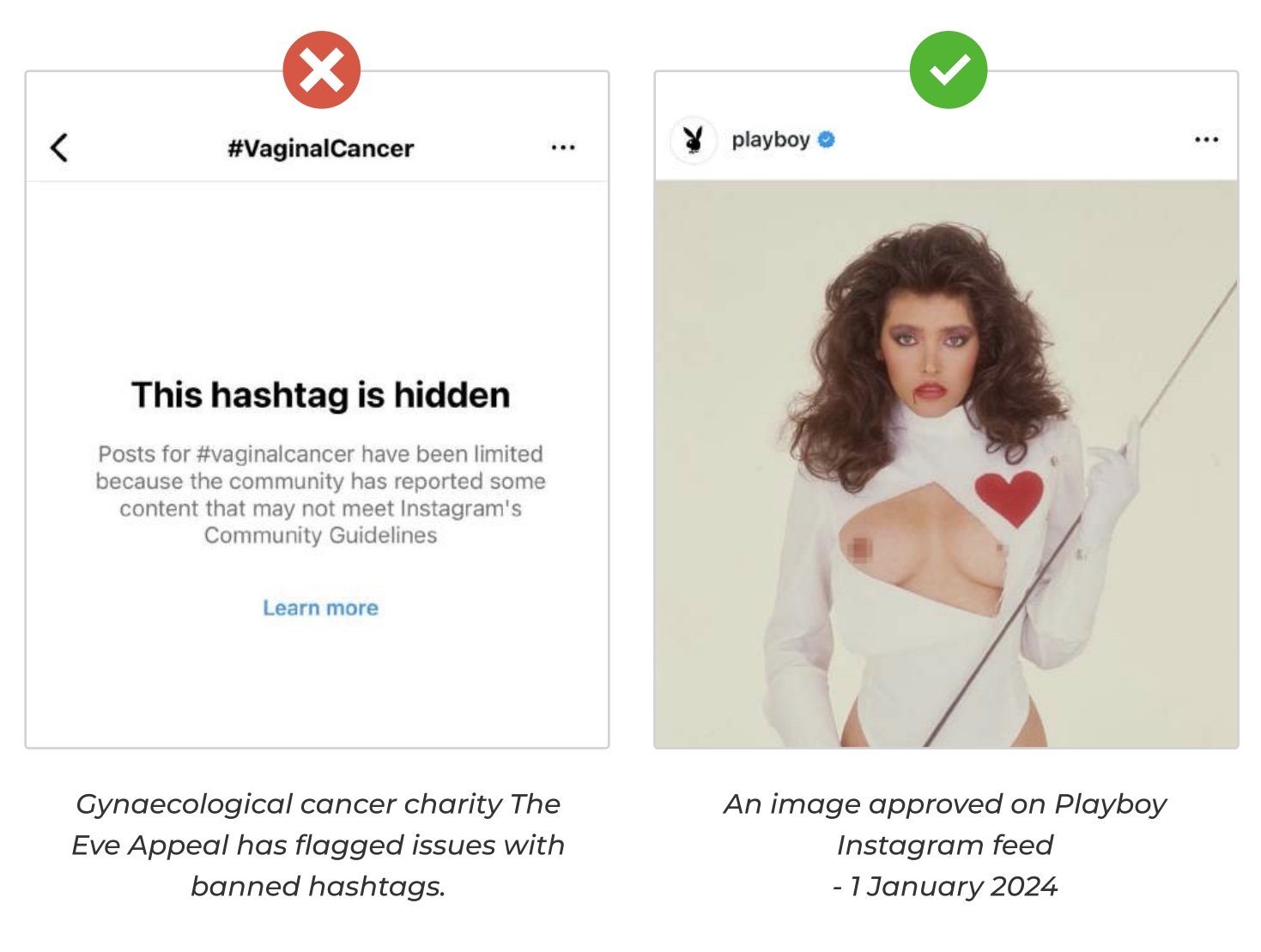More than 190 organisations, founders, health professionals and campaigners have co-signed an open letter calling on social media platforms to end the routine censorship of women’s health content online.
Published by CensHERship and The Case For Her, the letter, signed by leaders of key startups including Clue, Essity (Bodyform), Love Honey, Evofem Biosciences, WUKA, Daye, HANX, Bea and Fertility, exposes how medically accurate, non-sexual content is routinely flagged, removed, or hidden under vague and biased moderation policies.
Topics like menstruation, menopause, libido, postpartum recovery, and fertility are being silenced — simply for naming the realities of the female body.
“We will not replace vagina with ‘V-word’ or refer to menopause as ‘the change’,” the letter states.
“We will not avoid topics like libido, discharge, prolapse, or periods — because we need to talk about real bodies, real experiences, and real health concerns.”
The open letter is backed by a newly published whitepaper which compiles more than a year’s worth of evidence, survey data, and case studies from women’s health brands and content creators.
The campaign follows formal complaints filed in March 2025 by CensHERship and The Case For Her under the EU Digital Services Act (DSA). These complaints, submitted on behalf of six women’s health companies, documented biased moderation, lack of transparency, and failures to provide effective appeal mechanisms. Despite clear evidence and growing public concern, no meaningful response or action has been taken to date.
“It’s time to level the playing field for women’s health content,” said Clio Wood and Anna O’Sullivan, co-founders of CensHERship.
“This isn’t about isolated errors. It’s about an entire digital ecosystem that treats women’s health as inappropriate. This censorship isn’t just frustrating - it’s economically damaging and, in some cases, can cost lives.”
Key findings from the whitepaper include:
- 95 per cent of women’s health creators surveyed experienced censorship in the past year.
- More than half said they now self-censor their language to avoid takedowns.
- Platforms including Meta, TikTok, LinkedIn, Google, and Amazon were all cited for repeated suppression of content, often with no clear explanation or route to appeal.

Specific examples include:
- Meta removes the word “vagina”: A health coach sharing medically accurate posts about pelvic floor health had her Instagram account flagged repeatedly for using the word “vagina”—despite the content being educational and not sexual in nature.
- TikTok shadowbans endometriosis content: A creator posted educational videos on endometriosis symptoms. Despite strong engagement from viewers, her videos were suppressed in search and for-you feeds. TikTok provided no clear reason.
- LinkedIn flagged menopause product posts as “inappropriate”: A femtech founder advertising a menopause relief product on LinkedIn saw her posts taken down for allegedly violating “adult content” policies.
- Ad rejection for fertility apps: Facebook/Instagram ads promoting fertility awareness apps were rejected due to being classified under “adult products or services,” a category typically applied to sexual content or contraception.
- Google Search downranks postpartum care content: Websites focused on postpartum recovery saw organic search traffic plummet.

One founder noted:
“We lost 60 per cent of our traffic overnight after Google’s algorithm change. Our articles are medically reviewed, but we suspect they were flagged as sensitive.”
The report warns censorship isn’t just stigmatising, "It’s economically damaging and, in some cases, can cost lives." Menstruation, fertility, libido, menopause, and postpartum recovery content being stripped affects access to vital information and slows femtech innovation.
“When femtech companies face digital suppression and censorship by major tech platforms, their ability to reach people with essential health information, products, and services is severely limited,” said Cristina Ljungberg, co-founder of The Case For Her.
“This doesn’t just hinder access, it also decreases investment in much-needed innovation.”
The letter calls for:
- Social media platforms to update content moderation policies to reflect medical context and gender equity
- Policymakers to help bring platforms to the table and ensure digital regulation addresses gender bias;
- Investors and tech leaders to play their part to ensure women’s health innovation can scale without censorship.
To date, leaders from across women's health, including representatives from and more, have signed the open letter.
Lead image: Daye CBD tampons. Photo: uncredited.



Would you like to write the first comment?
Login to post comments